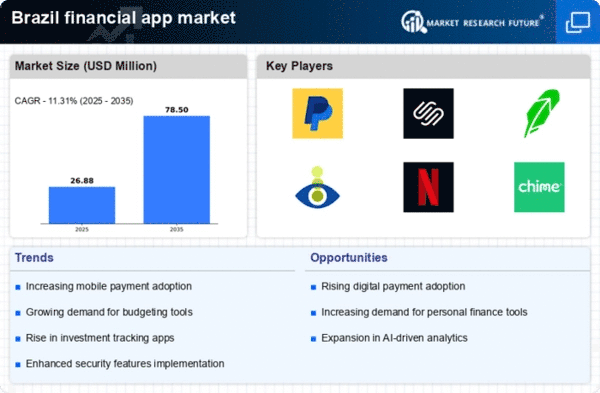Increasing Smartphone Penetration
The proliferation of smartphones in Brazil has been a pivotal driver for the financial app market. As of 2025, approximately 85% of the Brazilian population owns a smartphone, facilitating access to various financial services. This trend indicates a growing consumer base that is increasingly comfortable with mobile technology. The financial app market benefits from this shift, as users seek convenient solutions for banking, investing, and budgeting. Moreover, the rise in smartphone usage correlates with a surge in mobile internet access, which is projected to reach 90% by the end of 2025. This accessibility allows financial apps to reach a broader audience, enhancing user engagement and adoption rates. Consequently, the financial app market is likely to experience substantial growth as more Brazilians leverage their smartphones for financial management.
Emphasis on Data Security and Privacy
As the financial app market continues to expand in Brazil, concerns regarding data security and privacy have become paramount. With increasing incidents of cyber threats, users are more cautious about sharing their financial information. The financial app market is responding to this demand by implementing advanced security measures, such as encryption and biometric authentication. According to recent surveys, over 70% of Brazilian consumers prioritize data security when choosing a financial app. This emphasis on security not only builds trust among users but also drives the development of more robust applications. Companies that prioritize data protection are likely to gain a competitive edge in the market, as consumers gravitate towards platforms that ensure their financial information is safeguarded. Consequently, the financial app market is expected to evolve with a strong focus on enhancing security features.
Growing Demand for Financial Inclusion
The drive for financial inclusion in Brazil is a significant factor influencing the financial app market. Approximately 45% of the Brazilian population remains unbanked or underbanked, highlighting a substantial opportunity for financial apps to bridge this gap. The financial app market is increasingly focusing on providing accessible solutions that cater to underserved populations, including low-income individuals and rural communities. By offering services such as microloans, digital wallets, and budgeting tools, financial apps can empower users to manage their finances effectively. This growing demand for financial inclusion is likely to spur innovation within the market, as companies develop tailored solutions that address the unique challenges faced by these demographics. As a result, the financial app market is poised for growth as it aligns with national efforts to enhance financial literacy and access.
Regulatory Support for Fintech Innovations
Brazil's regulatory environment has evolved to support fintech innovations, significantly impacting the financial app market. The Central Bank of Brazil has implemented measures to foster competition and innovation, such as the Open Banking initiative, which aims to enhance consumer choice and access to financial services. This regulatory framework encourages the development of new financial applications that cater to diverse consumer needs. As of 2025, the number of fintech companies in Brazil has surged, with over 800 registered entities, indicating a robust ecosystem for financial app development. The financial app market stands to gain from this supportive regulatory landscape, as it enables startups and established companies to introduce innovative solutions that enhance user experience and financial inclusion. This trend suggests a promising future for the financial app market as it adapts to regulatory changes.
Rise of E-commerce and Online Transactions
The expansion of e-commerce in Brazil has created a fertile ground for the financial app market. With online retail sales projected to reach $30 billion by the end of 2025, consumers increasingly rely on digital payment solutions. This trend has prompted financial app developers to integrate features that facilitate seamless online transactions, such as payment gateways and digital wallets. The financial app market is adapting to this shift by enhancing user experience and security measures, ensuring that consumers feel confident in their online transactions. Additionally, the rise of e-commerce has led to increased competition among financial apps, driving innovation and the introduction of new features. As more Brazilians engage in online shopping, the financial app market is likely to see sustained growth, reflecting the changing landscape of consumer behavior.

















